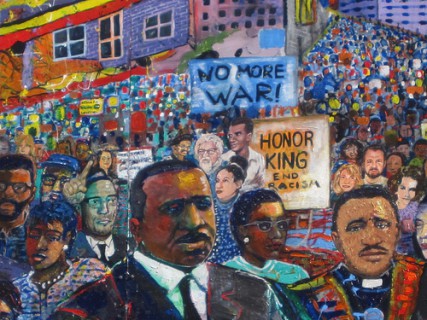
It’s Dr. Martin Luther King Jr.’s fault I’m a minister.
I’m not alone in making that statement. I’m the product of a generation of men and women who wanted to be like Dr. King. We were inspired by his intellect. We were moved by his use of language and passion for justice.
King’s dream took me to that mountaintop and had me screaming I have a dream just like you.
So, why do I feel so alone?
My understanding of God and ministry is rooted in the age of black radicalism. It was a period that forced black Christians to ask critical questions related to faith and identity. In many ways, the teachings of the black faith tradition did battle with an emerging consciousness. We embraced a black Jesus, and began pressing for the removal of white depictions of Biblical characters in our Sunday school books and stained glass windows.
Overcoming meant more than assimilation into white culture. It meant redefining the terms of faith by including space for affirming the witness of black Christians. We wanted to believe in King’s vision, while seeking ways to attack systems that undermine the quest for authentic liberation.
Dr. King set the paradigm for those committed to putting language to the struggle for true freedom. We sought meaning beyond the old answers by pressing deeper, much deeper, into the historical debate regarding God’s will. We desired the respect Dr. King garnered by gaining credentials that proved his worth among white contemporaries. In other words, we wanted to force them to listen.
We honored the virtue that comes with having done the hard work. Seminary training became the gauge to legitimize the move beyond the calling. Hearing God say “go” was the first step. It was followed by a willingness to stir up the gift of God. The call wasn’t enough.
Dr. King taught us to fight. Truth was our weapon. We fought because God was on our side.
So, again I must ask, why do I feel so alone?
Has King’s mountain-top vision, children of all hues holding hands, been altered to fit the American Dream? Have we translated King’s dream into a middle-class dogma promoting equal access to power and class privilege?
I feel alone due to the absence of a theology that assumes the need for social justice. Where is the anger of Columbia’s black faith community? Why isn’t it being preached? Why haven’t I heard cries for change?
Is the fight for justice old news? Have the business affairs of the local church taken precedent in a way that makes prophecy archaic? Is the weeping in the land a lower-class problem that has no place in the worship among middle-class black Christians?
Could it be that the excellence of Dr. King paved the way in forming an elite class of clergy intent on maintaining status quo? Maybe the lure of black class privilege makes it easy for clergy to refrain from preaching justice. Has the prophetic voice of the black faith tradition taken a pause due to the desire to keep a job while seeking a bigger congregation to serve?
Maybe there aren’t enough theologically trained clergy to continue the conversation. Have we become lazy and content? Have we been seduced by the drama associated with the prosperity gospel? Or, have too many become too comfortable with the thrills that come with minding their own business?
I feel alone in Columbia, Mo. I’m searching for black pastors to lead the way. Where are you? What are you preaching? Are you content with the madness unsettling the lives of the people you serve? Aren’t you tired of the violence? Haven’t you witnessed enough poverty to call for a change?
I became a minister because of Dr. King. His message confronts all of the assumptions I make regarding the rewards of my training. None of it belongs to me. The work of ministry should never be relegated to a conversation involving what we receive. The call challenges us to attack all assumptions related to positions of power and privilege.
Yes, power and privilege is found among black pastors. They hold the power not to preach justice.
This is a lesson about silence. Sin is found whenever we refuse to listen. Sin intensifies whenever we refuse to stand for those who can’t speak.
Dr. King was killed for preaching truth. Maybe that’s the lesson for us all. Don’t prophesy unless you are willing to take the bullet.
To that I say, yes Lord. Send me.
– See more at: http://carlkenney.columbiafavs.com/2014/01/16/search-black-pastors-lead-way/#sthash.IicoUQbs.dpuf








